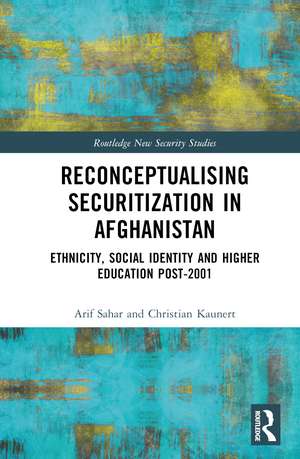Reconceptualizing Securitization in Afghanistan: Ethnicity, Social Identity, and Higher Education post-2001: Routledge New Security Studies
Autor Arif Sahar, Christian Kaunerten Limba Engleză Hardback – 9 dec 2024
Securitization is arguably the most successful theoretical framework to analyse security beyond the military confines. Yet, despite its broadening agenda, the securitisation framework has been accused of a Western bias. This book analyses the extent and the modalities and practices of the securitization of ethnic identities and social groups (e.g. women) by the state in Afghanistan post-2001, which is especially relevant following the takeover by the Taliban in August 2021. It puts forward a more nuanced argument by analytically distinguishing and empirically testing state policies, practices, and perspectives on ethnic and social groups that are largely informed by the fear and legacies of civil war (1978-2001). The work argues that the traditional lack of a stable state identity that could function as a basis for ontological security in Afghanistan has resulted in persistent state fragility exacerbated by the legacies and fears of civil war have had a direct impact on the development of the state’s perspectives on ethnic and social groups. Whilst the state does not necessarily indulge in explicit securitization practices and discourses, securitization often takes place through implicit activities to undermine ethnic and social groups’ ability to enter political, economic, and socio-cultural competitions fairly and equitably, which would in turn, enable these groups to challenge the state. The securitization process, therefore, has had an impact on the ability of these groups to benefit from opportunities fairly and equitably.
This book will be of much interest to students of critical security studies, statebuilding, Asian politics and International Relations in general.
Preț: 1001.87 lei
Preț vechi: 1221.79 lei
-18% Nou
Puncte Express: 1503
Preț estimativ în valută:
191.70€ • 200.88$ • 158.48£
191.70€ • 200.88$ • 158.48£
Carte tipărită la comandă
Livrare economică 12-26 aprilie
Preluare comenzi: 021 569.72.76
Specificații
ISBN-13: 9781032418797
ISBN-10: 1032418796
Pagini: 248
Dimensiuni: 156 x 234 mm
Greutate: 0.5 kg
Ediția:1
Editura: Taylor & Francis
Colecția Routledge
Seria Routledge New Security Studies
Locul publicării:Oxford, United Kingdom
ISBN-10: 1032418796
Pagini: 248
Dimensiuni: 156 x 234 mm
Greutate: 0.5 kg
Ediția:1
Editura: Taylor & Francis
Colecția Routledge
Seria Routledge New Security Studies
Locul publicării:Oxford, United Kingdom
Public țintă
Postgraduate, Professional, and Undergraduate AdvancedCuprins
Introduction Chapter 1: Ontological Securitization in the State of Afghanistan Chapter 2: Conceptualization of Securitization Processes and Higher Education Chapter 3: Securitization in Afghanistan Chapter 4: Desecuritization in Afghanistan Chapter 5: Deradicalization and Nation-building in Afghanistan Chapter 6: Peacebuilding in Afghanistan Conclusion
Notă biografică
Arif Sahar holds a PhD from University College London (UCL), and is a researcher within the Centre of Excellence in Terrorism, Resilience, Intelligence and Organised Crime Research (CENTRIC) Institute at Sheffield Hallam University.
Christian Kaunert is a Professor of International Security at Dublin City University, Ireland, and Professor of Policing and Security, as well as Director of the International Centre for Policing and Security at the University of South Wales. He is author/editor of six books, including, most recently, Securitization outside the West (2022).
Christian Kaunert is a Professor of International Security at Dublin City University, Ireland, and Professor of Policing and Security, as well as Director of the International Centre for Policing and Security at the University of South Wales. He is author/editor of six books, including, most recently, Securitization outside the West (2022).
Descriere
This book analyses the securitization of ethnic identities and social groups by the state in Afghanistan in the post-2001 context.













